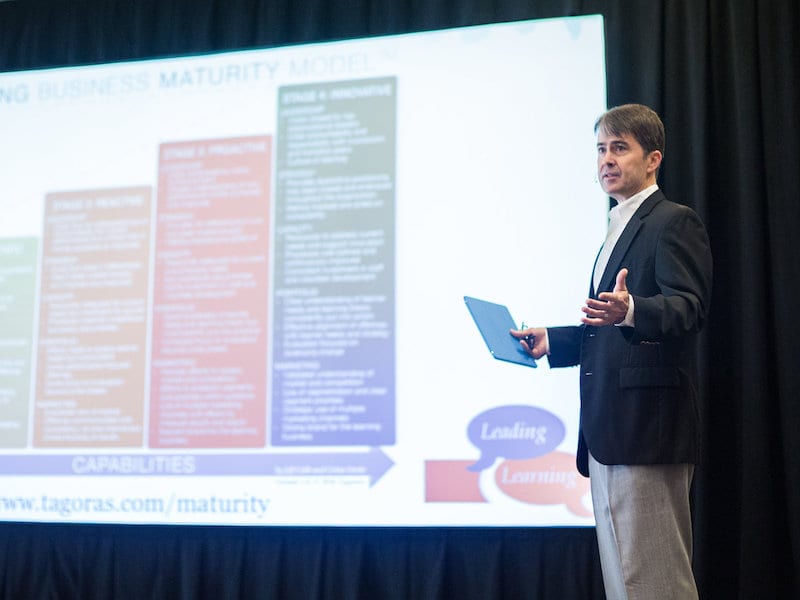

Seminars and workshops are big business, with thousands being run every year across the U.S. A quick search of Eventbrite, for example, reveals around 35,000 upcoming seminars, and that’s only on one platform. With attendees in the hundreds and/or admission fees in the thousands for the largest and most successful seminars, they can be a great source of revenue for edupreneurs.
If you can teach your subject in a classroom setting or via an online course, there’s no reason you can’t convert what you know into an informative and engaging seminar.
Choosing a seminar topic
While the list of subjects that can be taught in a seminar is almost endless, some make better seminar topics than others. Entrepreneur notes that leadership skills, self-help, and sales are among the most popular seminar subjects. It makes sense if attendees are investing hundreds, or perhaps thousands, of dollars in seminars that they perceive a concrete return on their investment. Offering to teach marketable skills that will advance attendees’ careers or otherwise improve their lives is always going to be an appealing proposition.
But that doesn’t mean you can’t create a successful seminar for any subject.
Just be clear about the end goal of your target attendees, and how you can write a seminar that delivers. Many people enjoy learning for its own sake, and a seminar based on a hobby or interest, rather than a career opportunity, can still sell out. Consider the ever-popular Homebrew Con run by the American Homebrewers Association (did you know there are more than a million home brew aficionados in the States?), or the number of genealogy seminars available during Family History Month (Ancestry.com alone has over three million members).
Few attendees of homebrew or family research seminars intend to make any money from what they learn, but gaining more knowledge about an interest or pastime can be as much of an incentive to attend as the promise of a lucrative career enhancement.
You should also consider your own end goal when planning a seminar. Do you want to only educate through the seminar, or use it as a sales funnel for your other products, such as online courses, books, or speaking engagements? You could even use seminars to recruit and train new hires to work under you as you grow your business.
Identifying your target audience
If you’re already working as an edupreneur, you likely have an idea who your target audience is. Take the time to research your market and explore likely attendees if you offer a seminar. Look at the people who already purchase your products or engage with you about your subject material.
Knowing your audience is vital to running a successful seminar. You need to be able to reach and inform the right people in order to sell places, and understanding your target demographics will help you decide on details such as location, duration, and pricing. There’s no point offering a week-long, thousand-dollar seminar to low income learners.
Equally, if your seminar is aimed at C-suite executives you don’t want to underprice your fees and fail to fully capitalize on your opportunity. Dorie Clark, author of Entrepreneurial You, points out that underpricing your products is bad for business. Not only do you earn less than you should, you risk devaluing your brand in your consumers’ eyes. At the lowest level, this meaning always charging something for your seminars, even if it’s only $20. Everybody likes free, but it’s also a good way of ending up with a large percentage of no-shows. The smallest investment automatically adds value to a product or service.
Most edupreneurs are already underpricing their products. It can be daunting to stand your ground (or even increase your costs) when many online learning platforms are priced as a race to the bottom, but don’t underestimate the perceived worth of your products. If you’re offering to teach business skills to executives, you need to price for executives. Offering that course or seminar for pennies on the dollar is a bad business decision, which will make potential learners doubt your expertise.
Finally, keep in mind that many of the same methods that apply to assessing your market for online courses apply with face-to-face seminars. Use them, and also start working early to build your audience.
Creating your seminar
The knowledge you have gained about your target market becomes invaluable information in helping you build your seminar. If you’re offering a short, low priced introduction to your field, you’ll be writing far less than if you’re putting on a multi-day, intensive exploration of your subject.
Your considerations should include the overall purpose of your seminar, the individual lessons you wish to cover (for seminars with multiple sessions), the class goals, and overall length. Don’t forget to think about your audience’s attention span and the sorts of illustrative materials and handouts you might need.
How does each part of your seminar help you achieve your end goal? What information is being imparted at each step? If you already offer an online course on your seminar subject, look at learner feedback and data such as drop-off rates and locations to help you structure and tailor your seminar for a live audience.
And, always, keep the principles of adult learning in mind.
Finding the right location
Often the largest single expense of a seminar is the venue. Getting it wrong can blow your budget or deter potential attendees. Think realistically about the size of your seminar. If you’re planning a multi-day event, does the venue offer accommodation (or is there suitable accommodation nearby for attendees on all budgets)? Is the venue the right size for a realistic attendee-count? Too small and you’ll have to turn people away. Too large, and you’ll create a negative social effect. Being unable to fill a room is awkward and leaves those who are there feeling embarrassed. Not the impression you want to create!
It’s always preferable to limit the venue size and attendee numbers below a realistic estimate of how many people are interested in going. That way you won’t be embarrassed by empty space, but instead will create a positive social impression by hosting a successful, sold-out seminar. The fear of missing out (FOMO) is a documented psychological phenomenon that can be harnessed to drive your seminar success.
As well as venue size, also consider its accessibility. Are there good links by road, air, and public transport? An older venue in the heart of downtown is often a better choice than a beautiful location in the middle of nowhere that charges for parking.
Seminars are hosted all over the States, so you aren’t limited to the venues in your local area, but if you do want to travel, consider the appeal of the location you choose. Las Vegas, for example, is a popular destination for seminars, but don’t forget your audience’s budget if they will also have to travel to attend. (And, of course depending on your topic and audience, your prospective learners may not be happy about Vegas as a destination!)
If you’re planning a local interest seminar, or you know you’ll have many attendees from a particular community, then choosing a venue nearest your target audience will generate more interest than a beach resort on the other side of the country.
Promoting your seminar
Your promotional efforts should be largely informed by your knowledge of your target audience. Are they members of a particular college or institution? Do they hang out on specific social media platforms? Focused promotion pays dividends over blanket advertising. Think about who is likely to attend your seminar, and how they’re most likely to see your promotional material.
Online, make sure information about your seminar is available wherever you have a web presence. Links on your website, social media, and from your online courses, ebooks, and more, will all help spread the word about your seminar. Targeted ads on social media platforms, as well as through search engines, will attract interested parties who don’t already follow you.
There are also websites devoted to upcoming seminars and other events. You can create listings and sell tickets through Eventbrite, Meetup, and other event ticketing websites. Don’t forget to speak to your venue about promoting your seminar on their website and through their social media.
Your promotion shouldn’t be limited solely to the internet. Most venues promote upcoming events at their location using flyers, posters, and programs. Approach your local newspaper and radio station about covering your seminar, and advertise in classifieds. If you have industry-specific publications, advertise with them as well, and talk to local colleges if there’s any overlap between your seminar material and the courses they offer.
Finally, don’t forget to speak to colleagues in your field and ask them to spread the word.
After your seminar
Your seminar might be over, but you’re not finished yet! Seminars are great platforms for generating additional sales of your other products, such as online courses, books, and even other seminars. Get feedback from your attendees to find out what worked, what didn’t, and what they want next. Stay in touch and network to find more opportunities, such as one-on-one teaching or guest speaking. Evaluate your successes, learn from any failures, and continually adjust in order to keep your seminar business growing.
Other posts in this series:
- Why you should start hosting seminars
- How to run a seminar on a budget
- How to take your seminar business online
Image by Rudy and Peter Skitterians from Pixabay
Table of Contents


